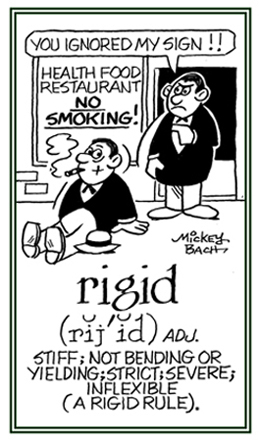rigi-, rig-
(Latin: stiff, hard, numb; to be frozen, to grow stiff with cold, to be chilled)
It is recognized widely as the most common sign, after early infancy, of meningeal irritation, notably of meningitis and bleeding into the subarachnoid space which is the layer of tissue situated or occurring between the arachnoid (like a cobweb of fibers) and the pia mater (the delicate and highly vascular, blood vessels, membrane immediately investing [covering or enveloping] the brain and the spinal cord).
When doctors move a person's limb passively around a joint, they note the degree of resistance to movement (muscle tone).
Muscle tone which is uneven and suddenly increased (spasticity) may be a result of a stroke or spinal cord injury.
Muscle tone that is evenly increased (rigidity) may be caused by disease of the basal ganglia; such as, Parkinson's disease.
Muscle tone is severely reduced (flaccid) immediately and temporarily after a spinal cord injury produces paralysis.
2. Approaching rigid or stiff characteristics.
3. Referring to something which is unchanged and strictly adhered to and not allowed to be disobeyed: Military organizations have rigid forms of rules that its members must obey when given orders by superior officers.
4. Etymology: from Latin rigidus, "hard, stiff, rough, severe"; from rigere, "to be stiff"; related to Latin frigus, "cold" and Greek rhigos, "frost, cold".

Go to this Word A Day Revisited Index
so you can see more of Mickey Bach's cartoons.
A conveyor is any materials-handling machine designed to move individual articles; such as, solids or free-flowing bulk materials over a horizontal, inclined, declined, or vertical path of travel with continuous motion.
2. An actual body whose behavior approaches that of an ideal rigid body; such as, a steel beam.
3. An idealized extended solid whose size and shape are definitely fixed and remain unaltered when forces are applied.
The rigid body assumption is a mathematical convenience that is useful and gives correct results for many important phenomena.
2. A thick portland cement pavement on a gravel base and subbase, with steel reinforcement and often with transverse joints.


